Words of Wisdom - Shastra
& Shastrakaras speak
For Books and shastra downloads see Main Index, under
Books:
Om Namo Bhagavate Vasudevaya
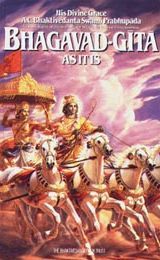

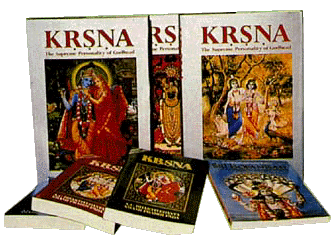
The Complete Works of Srila Prabhupada
All the books, the letters and conversations at your
fingertips


All Srila Prabhupada's books and more on one disk
http://www.vedabase.com





Srila Prabhupada's Audio lectures to listen to on-line:
http://www.hare-krishna.org/srila-prabhupada-lectures.htm
Listen to Srila A.C. Bhaktivedanta Swami Prabhupada on-line
- all 900 of his lectures are available HERE:
http://www.prabhupadavani.org/
Srimad Bhagavatam - the entire lecture series listen and
read along on-line - Narrated by Amala Bhakta dasa:
http://www.prabhupadavani.org/SB_index.html

The new enhanced Prabhupada MP3 series
http://www.prabhupada.com/store/store.php?page=product.php&id=MP3AUDIOLIB








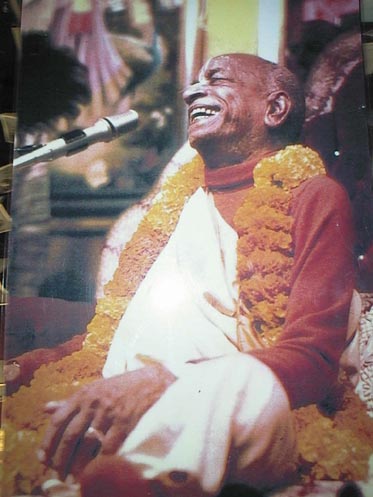
Visit "Prabhupada Connect" for all manner of Prabhupad
Nectar:
http://www.prabhupadaconnect.com/Index.html
Srila Prabhupada's Final Lesson Video - Downloadable and
viewing on-line
http://users.iskconludhiana.com/images/thumbnails.php?album=21


All Srila Prabhupada's original books
available for sale here.

Download all the Hare Krsna teachings which includes
all Vaisnava and
Vedic concepts by visiting one of the sites listed at
the following address.
http://www.geocities.com/suci123/bookdownloadsites1.html
The Bhaktivedanta Book Trust
Srila Prabhupad Memorial Library
http://www.krishna.com/main.php?id=33


33 Books Online Including Srimad Bhagavatam!
http://www.geocities.com/freeprabhupadabooks
The compressed "self extracting" file mentioned is now currently
available for download
http://www.krsnaconsciousness.org/Gauranga/Folio/BhaktivedantaVedabase_DOS.exe

Download or Listen to Prabhupad Bhajans HERE:
http://www.prabhupadavani.org/web/text/Bhajans.html


On-line 1972 McMillan edition - Bhagavad Gita As It Is:
http://www.asitis.com/

Bhagavad Gita AS IT IS on-line through the Tirupathi
Balaji site:
http://www.bhagavad-gita.us/

Bhagavad Gita Study guide on-line book:
http://chantandbehappy.com/gita/studyguide/StudyGuide-main.htm
Bhagavad Gita Study guides by numerous Iskcon devotees
- FREE downloads:
http://www.veda.harekrsna.cz/library/#3

All the Scriptures you'd ever need 4 FREE
http://www.hknet.org.nz/index-books.htm
http://www.hknet.org.nz/DDB.htm
http://www.hknet.org.nz/DDB2.html
last updated 4th August 2003


Srimad Bhagavad Gita AS
IT IS
Bhagavad Gita: Chapter
6 - Dhyana-yoga
TEXT 6
bandhur atmatmanas tasya
yenatmaivatmana jitah
anatmanas tu satrutve
vartetatmaiva satru-vat
WORD FOR WORD
bandhuh--friend; atma--the mind; atmanah--of the living
entity; tasya--of him; yena--by whom; atma--the mind; eva--certainly; atmana--by
the living entity; jitah--conquered; anatmanah--of one who has failed to
control the mind; tu--but; satrutve--because of enmity; varteta--remains;
atma eva--the very mind; satru-vat--as an enemy.
TRANSLATION
For him who has conquered the mind, the mind is the best of friends;
but for one who has failed to do so, his mind will remain the greatest
enemy.
PURPORT by HDG Srila A.C. Bhaktivedanta Swami Prabhupada:
The purpose of practicing eightfold yoga is to control the mind in
order to make it a friend in discharging the human mission. Unless the
mind is controlled, the practice of yoga (for show) is simply a waste of
time. One who cannot control his mind lives always with the greatest enemy,
and thus his life and its mission are spoiled. The constitutional position
of the living entity is to carry out the order of the superior. As long
as one's mind remains an unconquered enemy, one has to serve the dictations
of lust, anger, avarice, illusion, etc. But when the mind is conquered,
one voluntarily agrees to abide by the dictation of the Personality of
Godhead, who is situated within the heart of everyone as Paramatma. Real
yoga practice entails meeting the Paramatma within the heart and then following
His dictation. For one who takes to Krsna consciousness directly, perfect
surrender to the dictation of the Lord follows automatically.
His Divine Grace A.C. Bhaktivedanta Swami Prabhupada
Copyright 1983 The Bhaktivedanta Book Trust International. Used with
permission.

Bhagavad Gita As It Is - http://www.asitis.com/
Bhaktivedanta Vedabase - Bhagavad Gita on-line http://bhagavadgitaasitis.com/
Bhaktivedanta VedaBase: Bhagavad-gita As It Is http://vedabase.net/bg/en
Bhagavad Gita Multi Media Web-version http://chantandbehappy.com/gita/
Listen to Bhagavad Gita on line - http://www.Gitamrta.org
View our Bhagavad Gita Overview:
http://www.hknet.org.nz/BG.html
Archive: http://www.cs.rice.edu/~vivek/btg/archive/
Home Page: http://www.cs.rice.edu/~vivek/btg/
Join Bhagavad Gita eGroups HERE
mailto:bhagavad_gita-owner@egroups.com


Prabhupada Uvacha:
(here's some nectar, sometimes it comes in the form of Srutakirti prabhu's
diary, other times from Govinda dasi's diary, Hari Sauri prabhu's Transcendental
Diary, or sometimes from a letter, or other related source, but still nectar...)
Rupanuga's Empowered Preaching
I lived in the temple and attended classes during
the final semester of my senior year at the University of Buffalo. Every
evening after studying in the university library, I would go home to the
temple and be greeted by Rupanuga, his wife, their five-year-old son, and
the other students or friends who had joined. Prasadam, especially the
hot dal, always tasted incredible after a day at school. Later, we would
all gather around the big gas stove outside the temple room and savor "banana
nectar" -- milk with mashed bananas, spiced with cinnamon, cloves, coriander,
and vanilla beans sizzled in ghee before being added. We brahmacaris would
then carry our sleeping bags into the temple room, crawl in, and fall asleep.
Rupanuga's Buffalo preaching success was unique
and outstanding. Our La Salle St. temple was lively, with university students
dropping by for morning Srimad-Bhagavatam classes, thrice-weekly evening
Bhagavad-gita classes, and our Sunday feast. (It was my service to telephone
all the people listed in our guestbook and invite them to the feast.) On
Tuesdays and Thursdays we held a Bhakti-Yoga Class at the student union.
Rupanuga continued his program for years. By the
time I left Buffalo, Trivikrama, Jagadisa, and Prahladananda had joined.
Rupanuga's accredited course on the Bhagavad-gita attracted Bhagavan and
Krsna Bhamini dasi to join. Gunagrahi and Kusakratha soon followed, and
Romapada had already received his first BTG. Ayodhyapati, Laksmimoni dasi,
Narottamananda, Nityananda, Tejiyas, Madira dasi, Satyavrata, Muktakesa,
Lokavarnottama, and many others joined the Buffalo temple after I left.
In addition, two other successful temples -- Detroit and Toronto -- were
the direct result of Rupanuga's Buffalo preaching success.
The mood in Buffalo, and throughout the movement
at this time, was to follow Prabhupada's fearless preaching spirit. Prabhupada
had directly inspired us by his example and words. He wrote to Brahmananda
in 1967:
I have read your statements regarding opening
centers. I am not in agreement with Mr. Altman that we are expanding very
thinly. In my opinion, a single sincere soul can maintain a center. You
know I started the center at 26 Second Avenue alone. I took the risk of
200.00 dollars per month for the rent. At that time there were no assistants.
Mukunda was at that time a friend, but there was no responsibility for
him for maintaining the center. Gradually Kirtanananda and Hayagriva joined,
but they did not take any responsibility. Still I was maintaining the establishment
simply depending on Krishna and then Krishna sent me everything -- men
and money. Similarly, if a sincere soul goes out and opens a center in
any part of the world, Krishna will help him in all respects. Without being
empowered by Krishna, nobody can preach Krishna consciousness. It is not
academic qualification or financial strength that helps in these matters,
but it is sincerity of purpose which helps us always. Therefore, I wish
that you will remain in charge of New York, let Satsvarupa be in charge
of Boston, let Mukunda be in charge of San Francisco, let Janardana be
in charge of Montreal. Let Nandarani and Dayananda be in charge of Los
Angeles, and let Subala das be in charge of Santa Fe. In this way you will
follow my example as I did in the beginning at 26 Second Ave. That is preaching,
cooking, writing, talking, chanting, everything one man's show. I never
thought about the audience. I was prepared to chant if there was no man
to hear me. The principle of chanting is to glorify the Lord and not to
attract a crowd. If Krishna hears nicely then He will ask some sincere
devotees to gather in such place. Therefore, be advised that thousands
of centers may be started if we find out a sincere soul for each and every
center. We do not require more men to start. If there is one sincere soul
that is sufficient to start a new center. Let us remain sincere to Krishna
and His bona fide representative and we are sure to carry out our mission
successfully. Hope you are well.
Your ever well-wisher,
A.C. Bhaktivedanta Swami
- From the "My Glorious Master" by HG Bhurijana
dasa
To receive little snippets of nectar like this on a daily basis subscribe
HERE: or If you want to introduce anyone else in reading Srila Prabhupada
Nectars, please send their eMail addresses to mailto:krpamaya_gauranga@hotmail.com
Please Chant:
 Hare
Krishna Hare Krishna Krishna Krishna Hare Hare
Hare
Krishna Hare Krishna Krishna Krishna Hare Hare
 Hare
Rama Hare Rama Rama Rama Hare Hare
Hare
Rama Hare Rama Rama Rama Hare Hare
...................and be Happy

Listen to Srila Prabhupad on-line
....a different lecture, morning walk, conversation or
class daily.
"From Pretension to Purity"
>>> Ref. VedaBase => Bhagavad-gita 3.6-10 -- Los Angeles, December 23,
1968
Listen to the entire lecture on-line:
http://prabhupadaradio.com/M3U/Gita/m3u/GT111.m3u
Prabhupada: Hare Krsna. Yes, read. Which verse? Go on.
Sudama: "One who restrains the senses and organs of action
but whose mind dwells on sense objects certainly deludes himself and is
called a pretender [Bg. 3.6]."
Prabhupada: Yes. This is very important thing. Yoga indriya-samyamya.
Yoga, the definition of yoga means sense control, controlling the sense.
So here Krsna says that you cannot control your senses artificially. It
is not possible. Those who are trying... Just like some of the yogis, they
close their eyes, "Oh, I'll not see beautiful woman." That is another practice,
but that does not mean that he can control his senses. No. You cannot curb
down the natural force of sense. This is the secret. People do not know.
And if you let the senses go on in its own way, that is also dangerous.
Then you are going to hell. Adanta-gobhir visatam tamisram. If your senses
are not controlled, then your senses will drag you to the darkest region
of hell. That is another problem.
Generally, in the material world, adanta -- adanta means
uncontrolled, go -- go means senses. Adanta-gobhir visatam tamisram punah
punas carvita-carvananam [SB 7.5.30]. Simply repeating, chewing the chewed.
The whole history of the world, you just study, is a history of sense gratification.
Just take, for example, some twenty years ago one Mr. Adolf Hitler came
in the scene, and there was great upheaval as war in Europe and America.
From 1933 to 1947 or something like that, the whole world was in trouble.
But he is gone, finished. And what did he do? Sense gratification, that's
all. He wanted that this way government should be, according to his own
sense. Another person, just like Mr. Churchill or your President Roosevelt,
they said "No. The sense gratification should not be like that. The sense
gratification should be like this." (laughter) So it is the war of sense
gratification, that's all. One leader is presenting a program of sense
gratification, another leader is presenting another program of sense gratification,
and there is clash. This is going on. This is the history of the world.
And another class, they are thinking "Oh, there are so
much trouble simply for sense gratification. Let us control our senses."
Brahma satyam jagan mithya, just like Mayavadi philosophers, Sankaracarya.
They say this world is useless. This world is useless. Only Brahman, the
Supreme Brahman, impersonal Brahman, that is truth. That is also another
sense gratification. That is bigger sense gratification. Why? These Mayavadi
philosophers, they want to merge into the existence of the Supreme One.
That means by becoming Hitler, Churchill or Roosevelt, their senses were
not very much satisfied. "Now," they say, "this world is false. Now let
me become the Supreme." That is another sense gratification.
So this world, without Krsna consciousness, is simply
sense gratification. That's all. One may present in one way, another may
present in another way, but it is sense gratification. Therefore the so-called
yogis, fifteen minutes meditation or, say, fifteen hours meditation or
fifteen months meditation, but as soon as meditation finished -- sense
gratification. That's all.
So this sense gratification program is very strong. And
so long you will indulge in sense gratification, the repetition of birth
and death will go on. The repetition of birth. This body...Bhagavata says
that these people are working for sense gratification. Nunam pramattah.
Pramattah means mad after sense gratification. Kurute vikarma. And for
sense gratification, they are acting so abominably that it is not to be
uttered. Kurute vikarma yad indriya-pritaya aprnoti. They have engaged
their life in sense gratification. Na sadhu manye, oh this is not good.
This is not good.
Why? Yata, because, atmanah, the spirit soul, atmano 'yam...
Asann api klesada asa dehah [SB 5.5.4]. This body is temporary, but so
long this body is there, you'll have to suffer. What is that suffering?
The sum total of suffering is birth, death, old age and disease. This is
due to this body. Therefore the problem is how to stop this material body,
repetition. Today I have got this body, Indian, tomorrow I may get American,
next birth... Tomorrow means next birth. Next birth another, next birth
another, next birth another -- it is going on. Going on. There is no stoppage,
this transmigration of the soul.
But so long you do not stop it, there is no question of
being freed from sufferings. They do not know it. They are thinking they
are advancing. What advancement you have made? These sufferings are there
-- birth, death, old age and disease. You cannot stop it. Abrahma-bhuvanal
lokah, and even you go to this moon planet or to the highest planet, these
four things will follow. So therefore sense gratification must be stopped.
But if you want to stop it artificially it is impossible. Neither by this
yoga process, neither by this jnana process. Simply for the time being
you can check.
Just like a naughty boy. By force, you can stop him acting
mischievously. But as soon as he gets opportunity, again he will act so.
Similarly, senses are very strong. You cannot stop them artificially. Therefore
the only remedy is Krsna consciousness. These boys in Krsna consciousness,
this is also sense gratification, eating nice prasada, dancing, chanting,
reading philosophy -- but it is in connection with Krsna. That is the significance.
Nirbandhah krsna-sambandhe. It is the sense gratification of Krsna. Not
directly, but because I am part and parcel of Krsna, my senses are automatically
satisfied. This process should be adopted. Artificially...
continued.......................
Listen to the entire lecture on-line:
http://prabhupadaradio.com/M3U/Gita/m3u/GT111.m3u
or receive in mailbox and Subscribe HERE:
mailto:lectures-subscribe@prabhupadavani.org
Sravanam kirtanam at:
http://www.PrabhupadaVani.org
© 2001 The Bhaktivedanta Book Trust International. Used with permission.


SRILA PRABHUPADA'S QUOTE OF THE DAY
The more you serve, the more you relish taste.
Without relishing taste, nobody can render devotional service. It is practical.
The Nectar of Devotion,
Vrndavana 1972
Sign-up to receive these quote HERE:
mailto:haribol@pacific.net.sg

Bhaktivedanta Vedabase Network ...
http://vedabase.net/


The Scientific - Mathematical
Proof for God's existence:
http://geocities.com/sector114

http://robot-hosting.com/php/login_nicholas.html
user name = guest
password = guest
(Collection of philosophical and mathematical proofs
for existence of God can be found in this site.)

Scientifically Philosophical Books for the layman
 ...
... ...
...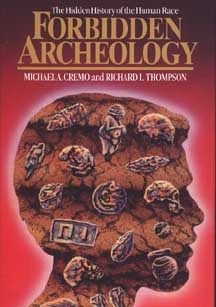 ...
...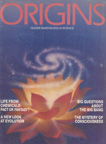
Click on any of these books to read more about them and where to get
a copy
or contact your local temple for purchases
sample of Life
comes from Life HERE.pdf

Lotus Imprints - Preserving Prabhupada's Legacy - The
Publishing House of Hari Sauri dasa
http://www.lotusimprints.com/

Quotes from Shastra - scriptures
View using Balaram font



and Vegetarian Awareness month of October
View using Balaram font
Kåñëa says in Bhagavad-gétä
(9.27):
yat karoñi yad açnäsi
yaj juhoñi dadäsi yat
yat tapasyasi kaunteya
tat kuruñva mad-arpaëam
"O son of Kunté, all that
you do, all that you eat, all that you offer and give away, as well as
all austerities that you may perform, should be done as an offering unto
Me."
patraà puñpaà
phalaà toyaà
yo me bhaktyä prayacchati
tad ahaà bhakty-upahåtam
açnämi prayatätmanaù
SYNONYMS
patram—a leaf; puñpam—a flower;
phalam—a fruit; toyam—water; yaù—whoever; me—unto Me; bhaktyä—with
devotion; prayacchati—offers; tat—that; aham—I; bhakti-upahåtam—offered
in devotion; açnämi—accept; prayata-ätmanaù—from
one in pure consciousness.
TRANSLATION
If one offers Me with love and devotion
a leaf, a flower, fruit or water, I will accept it.
PURPORT
For the intelligent person, it is
essential to be in Kåñëa consciousness, engaged in the
transcendental loving service of the Lord, in order to achieve a permanent,
blissful abode for eternal happiness. The process of achieving such a marvelous
result is very easy and can be attempted even by the poorest of the poor,
without any kind of qualification. The only qualification required in this
connection is to be a pure devotee of the Lord. It does not matter what
one is or where one is situated. The process is so easy that even a leaf
or a little water or fruit can be offered to the Supreme Lord in genuine
love and the Lord will be pleased to accept it. No one, therefore, can
be barred from Kåñëa consciousness, because it is so
easy and universal. Who is such a fool that he does not want to be Kåñëa
conscious by this simple method and thus attain the highest perfectional
life of eternity, bliss and knowledge? Kåñëa wants only
loving service and nothing more. Kåñëa accepts even a
little flower from His pure devotee. He does not want any kind of offering
from a nondevotee. He is not in need of anything from anyone, because He
is self-sufficient, and yet He accepts the offering of His devotee in an
exchange of love and affection. To develop Kåñëa consciousness
is the highest perfection of life. Bhakti is mentioned twice in this verse
in order to declare more emphatically that bhakti, or devotional service,
is the only means to approach Kåñëa. No other condition,
such as becoming a brähmaëa, a learned scholar, a very rich man
or a great philosopher, can induce Kåñëa to accept some
offering. Without the basic principle of bhakti, nothing can induce the
Lord to agree to accept anything from anyone. Bhakti is never causal. The
process is eternal. It is direct action in service to the absolute whole.
Here Lord Kåñëa,
having established that He is the only enjoyer, the primeval Lord and the
real object of all sacrificial offerings, reveals what types of sacrifices
He desires to be offered. If one wishes to engage in devotional service
to the Supreme in order to be purified and to reach the goal of life—the
transcendental loving service of God—then one should find out what the
Lord desires of him. One who loves Kåñëa will give Him
whatever He wants, and he avoids offering anything which is undesirable
or unasked. Thus meat, fish and eggs should not be offered to Kåñëa.
If He desired such things as offerings, He would have said so. Instead
He clearly requests that a leaf, fruit, flowers and water be given to Him,
and He says of this offering, "I will accept it." Therefore, we should
understand that He will not accept meat, fish and eggs. Vegetables, grains,
fruits, milk and water are the proper foods for human beings and are prescribed
by Lord Kåñëa Himself. Whatever else we eat cannot be
offered to Him, since He will not accept it. Thus we cannot be acting on
the level of loving devotion if we offer such foods.
In the Third Chapter, verse thirteen,
Çré Kåñëa explains that only the remains
of sacrifice are purified and fit for consumption by those who are seeking
advancement in life and release from the clutches of the material entanglement.
Those who do not make an offering of their food, He says in the same verse,
are eating only sin. In other words, their every mouthful is simply deepening
their involvement in the complexities of material nature. But preparing
nice, simple vegetable dishes, offering them before the picture or Deity
of Lord Kåñëa and bowing down and praying for Him to
accept such a humble offering enables one to advance steadily in life,
to purify the body, and to create fine brain tissues which will lead to
clear thinking. Above all, the offering should be made with an attitude
of love. Kåñëa has no need of food, since He already
possesses everything that be, yet He will accept the offering of one who
desires to please Him in that way. The important element, in preparation,
in serving and in offering, is to act with love for Kåñëa.
The impersonalist philosophers, who
wish to maintain that the Absolute Truth is without senses, cannot comprehend
this verse of Bhagavad-gétä. To them, it is either a metaphor
or proof of the mundane character of Kåñëa, the speaker
of the Bhagavad-gétä. But, in actuality, Kåñëa,
the Supreme Godhead, has senses, and it is stated that His senses are interchangeable;
in other words, one sense can perform the function of any other. This is
what it means to say that Kåñëa is absolute. Lacking
senses, He could hardly be considered full in all opulences. In the Seventh
Chapter, Kåñëa has explained that He impregnates the
living entities into material nature. This is done by His looking upon
material nature. And so in this instance, Kåñëa's hearing
the devotee's words of love in offering foodstuffs is wholly identical
with His eating and actually tasting. This point should be emphasized:
because of His absolute position, His hearing is wholly identical with
His eating and tasting. Only the devotee, who accepts Kåñëa
as He describes Himself, without interpretation, can understand that the
Supreme Absolute Truth can eat food and enjoy it. (Srila A.C. Bhaktivedanta
Swami Prabhupad. Bhagavad Gita As It Is 9:26 text and purport.)

The following Sections are from Sri Gaudiya Kantahara
Tamasic and Rajasic Foods are
Antagonistic to Bhakti
13.118
kaöv-amla-lavaëäty-uñëa-tékñëa-rükña-vidähinaù
ähärä räjasasyeñöä
duùkha-çokämaya-pradäù
Foods that are too bitter,
too sour, salty, hot, pungent, dry, and burning are dear to those in the
mode of passion. Such foods cause distress, misery, and disease. (Bhagavad-gétä
17.9)
13.119
yäta-yämaà gata-rasaà
püti paryuñitaà ca yat
ucchiñöam api cämedhyaà
bhojanaà tämasa-priyam
Foods prepared more than three
hours before being eaten, food that is tasteless, decomposed, and putrid,
and food consisting of remnants and untouchable things is dear to those
in the mode of darkness. (Bhagavad-gétä 17.10)
Meat-eating Destroys Bhakti
13.120
ye tv anevaà-vido 'santaù
stabdhäù sad-abhimäninaù
paçün druhyanti viçrabdhäù
pretya khädanti te ca tän
Those wicked persons who do
not know the real nature of dharma, who are proud and stubborn, who consider
themselves righteous and who mercilessly slaughter animals will, in their
next life, be eaten by the very beasts they kill.
(Srimad Bhägavatam. 11.5.14)
13.121
yo yasya mäàsam-açnäti
sa tan mäàsäda ucyate
matsyädaù sarva-mäàsädas-tasmän-mat-syän
vivarjayet
Whoever eats the meat of someone,
he is called the eater of the meat of that entity. But a fish eater is
considered as eater of all meats. Therefore one should not eat fish. (Manu-saàhitä
5.15)
The Senses are Like Wives, and
the Tongue is the Most Powerful
13.122
jihvaikato 'cyuta vikarñati
mävitåptä
çiçno 'nyatas tvag-udaraà
çravaëaà kutaçcit
ghräëo 'nyataç
capala-dåk kva ca karma-çaktir
bahvyaù sapatnya iva geha-patià
lunanti
My dear Lord, O infallible
one, my position is like that of a person who has many wives, all trying
to attract him in their own way. For example, the tongue is attracted to
palatable dishes, the genitals to sex with an attractive woman, and the
sense of touch to contract with soft things. The belly, although full,
still wants to eat more, and the ear, not attempting to hear about You,
is generally attracted to mundane songs and music. The sense of smell is
attracted by sweet fragrances, the eyes are attracted by beautiful forms,
and the active senses are attracted elsewhere. In this way, I am certainly
embarrassed.
(Srimad Bhägavatam. 7.9.40)
13.123
tävaj jitendriyo na syäd
vijitänyendriyaù pumän
na jayed rasanaà yävaj
jitaà sarvaà jite rase
Even if a person has conquered
every sense other than the tongue, he cannot be said to have subjugated
his senses until he has conquered the tongue and the sense of taste. The
sense of taste is the strongest sense; it is the most difficult to control,
especially when it becomes more acute as a result of hunger. (Srimad Bhägavatam.
11.8.21)
13.124
jihvära lälase yei
iti-uti dhäya
çiçnodara-paräyaëa
kåñëa nähi päya
One who is subservient to the
demands of the tongue and who thus runs here and there devoted to the genitals
and the belly, cannot attain Kåñëa. (Cc. Antya 6.227)
taken from Gaudiya Kantahara Thirteenth Jewel Sadhana-bhakti-tattwa

The Senses are Useless if Not
Used in Kåñëa's Service
13.132
taravaù kià na jévanti
bhasträù kià na çvasanty uta
na khädanti na mehanti kià
gräme paçavo 'pare
Do the trees not live? Do the
bellows of the blacksmith not breathe? All around us, do the beasts not
eat and discharge semen? (Srimad Bhägavatam. 2.3.18)
13.133
çva-viò-varähoñöra-kharaiù
saàstutaù puruñaù paçuù
na yat-karëa-pathopeto jätu
näma gadägrajaù
Men who live like dogs, hogs,
camels, and asses praise those men who never listen to the transcendental
pastimes of Lord Çré Kåñëa, the deliverer
from all evils. (Srimad Bhägavatam. 2.3.19)
13.134
bile batorukrama-vikramän ye
na çåëvataù karëa-puöe narasya
jihväsaté därdurikeva
süta na copagäyaty urugäya-gäthäù
One who has not listened to
the messages about the prowess and marvelous acts of the Supreme Person
and has not sung or chanted loudly the worthy songs about Him is considered
to possess earholes like the holes of snakes and a tongue like the tongue
of a frog. (Srimad Bhägavatam. 2.3.20)
13.135
bhäraù paraà
paööa-kiréöa-juñöam
apy uttamäìgaà
na namen mukundam
çävau karau no kurute
saparyäà
harer lasat-käïcana-kaokaëau
vä
The upper portion of the body,
though crowned with a silk turban, is only a heavy burden if not bowed
down before the Supreme Personality of Godhead, who can award liberation.
And the hands, although decorated with glittering bangles, are like those
of a dead man if not engaged in the service of Çré Hari.
(Srimad Bhägavatam. 2.3.21)
13.136
barhäyite te nayane naräëäà
liogäni viñëor
na nirékñato ye
pädau nåëäà
tau druma-janma-bhäjau
kñeträëi nänuvrajato
harer yau
Those eyes that do not look
at the form of the Supreme Lord are like those printed on the plumes of
a peacock, and the legs which do not move to the holy places are like tree
trunks. (Srimad Bhägavatam. 2.3.22)
13.137
jévaï chavo bhägavatäìghri-reëuà
na jätu martyo 'bhilabheta
yas tu
çré-viñëu-padyä
manujas tulasyäù
çvasaï chavo yas tu
na veda gandham
The person who has not received
the dust of the feet of the Lord's pure devotee upon his head is certainly
a dead body. And, although breathing, the person who has never experienced
the aroma of the Tulasé leaves from the lotus feet of the Lord is
also a dead body. (Srimad Bhägavatam. 2.3.23)
taken from Gaudiya Kantahara Thirteenth Jewel Sadhana-bhakti-tattwa

PrasAda-sevAya From GitAvali of Thakur Bhaktivinoda
Prayers for honering Prasadam
sarira avidya-jal, jadendriya tahe kal
jive phele vishaya-sagare
ta’ra madhye jihva ati-, lobhamay sudurmati,
ta’ke jeta kathina samsare
krishna bada dayamay, karibare jihva jay,
sva-prasadanna dila bhai
sei annamrita pao, radha-krishna-guna gao,
preme dako chaitanya-nitai
O Lord, this material body is a lump of ignorance, and the senses are
a network of paths to death. Somehow, we have fallen into this ocean of
material sense enjoyment, and of all the senses the tongue is most voracious
and uncontrollable; it is very difficult to conquer the tongue in this
world. But You, dear Krishna, are very kind to us and have given us such
nice prasadam, just to control the tongue. Now we take thisprasadam to
our full satisfaction and glorify Their Lordships Sri Sri Radha-Krishna,
and in love call for the help of Lord Chaitanya and Lord Nityananda.
To
hear and learn these prayers:
mahA-prasAde govinde nAma-brahmaNi vaiSNave
svalpa-puNya-vatAM rAjan vizvAso naiva jAyate
O king, for those with little pious credit, faith in mahA-prasAda, SrI
Govinda, the holy name, and the VaiSNavas never arises. [MahAbhArata]

YAT KINCID ALPAM NAIVEDYAM BHAKTA BHAKTI RASAPLUTAM
PRATI BHOJAYATI SRI SASTAD DATRN SVASUKHAM DRTAM
(HARI BHAKTI VILASA 8/195 from HARI BHAKTI SUDDHODAYA)
The Supreme Personality of Godhead becomes very satisfied even if very
minute food if offered to him by a devotee with full devotion and at once
He gives full happiness to the offerer.

YAD ANANDA KALAM GAYAN BHAKTAH PUNYA ASRU VARSATI
TAT SARVVA TIRTHA-SALILA SNANAM SVAMALA SODHANAM
(HARI BHAKTI VILASA 8/273 from HARI BHAKTI SUDDHODAYA)
Devoted devotees, while singing for the Supreme Lord with a choked
throat, with hairs standing on end, or with tears from their eyes like
rain, they burn their acquired sins, and achieve the merit of bathing in
all the places of pilgrimage.

APAVITRA YADANNAM SYAT PANIYAN CAPI PAPINAM
BHUKTVA PITVA VISUDDHAH SYAT PITVA PADODAKAM HAREH
(HARI BHAKTI VILASA 9/50 from BRAHMANDA PURANA conversation between
Lord Brahma and Narada Muni)
If someone has eaten impure foods from someone or has drank water left
from a great sinner, the sins which are derived from such eating and drinking,
can become nullified just by drinking the water which has emanated from
the lotus feet of Lord Sri Hari.

SUDDHAM BHAGAVATASYANNAM SUDDHAM BHAGIRATHI JALAM
SUDDHAM VISNU PARAM CITTAM SUDDHAM EKADASI VRATAM
(HARI BHAKTI VILASA 9/283 from SKANDA PURANA conversation between Markandeya
and Bhagiratha)
Food from the devotee of the Supreme Personality of Godhead, Ganges
water, the mind engaged in the lotus feet of Lord Visnu and the day of
Lord Hari, named Ekadasi, these are all pure.

PATRAM PUSPAM PHALAM TOYAM ANNA PANADY AUSADHAM
ANIVEDYA NA BHUNJITA YAD AHARAYA KALPITAM
ANIVEDYA TU BHUNJANAH PRAYASCITTI BHAVENNARAH
TASMAT SARVAM NIVEDYAIVA VISNOR BHUNJITA SARVADA
(HARI BHAKTI VILASA 9/338,339 from BRAHMANDA PURANA)
Leaves, flowers, fruits, water, grains, drinks, and medicines altogether,
whatever is to be used by a person, cannot be used without offering it
to the Supreme Lord. If somebody uses something without first offering
it to the Lord, that person must perform atonements. Therefore, everything
should be first offered to the Lord before taking it himself.

AMBARISA GRHE PAKVAM YAD ABHISTAM SADATMANAH
ANIVEDYA HARER BHUNJAN SAPTA KALPANI NARAKI
(HARI BHAKTI VILASA 9/34O from PADMA PURANA conversation between Gautama
and Ambarisa)
Oh Ambarisa, if anything desirable is being prepared within the
house, if iteaten without first offering it to Lord Janardana, that person
has to sufferin hell for seven kalpas (one kalpa is one thousand yugas).

AMBARISA NAVAM VASTRAM PHALAM ANNAM RASADIKAM
KRTVA VISNU UPABHUKTAN TU SADA SEVYAM HI VAISNAVAIH
(HARI BHAKTI VILASA 9/343 from VISNU SMRTI conversation between Gautama
Rsi and Ambarisa Maharaja)
A Vaisnava should always offer new clothes, fruits, grains, and
juices to the Supreme Lord Visnu before he accepts them for himself.

YO MAMA EVA ARCANAM KRTVA TATRA PRAPANAM UTTAMAM
SESAM ANNAM SAMASNATI TATAH SAUKHYA TARAM NU KIM
(HARI BHAKTI VILASA 9/390 from VARAHA PURANA)
After worshipping Me, one should offer Me sumptuous food, and
after offering it to Me, he should eat sumptuously. What would be more
pleasing than this?
See more about making offerings to Krishna here

BHAKTYA BHUNAKTI NAIVEDYAM SALAGRAMA SILARPITAM
KOTIM MAKHASYA LABHATE PHALAM SATA SAHASRASAH
(HARI BHAKTI VILASA 9/395 from SKANDA PURANA)
One who eats food after offering it to Salagram Sila, he achieves
the results of performing one hundred times one thousand times one million
fire sacrifices.
See more about Salagram silas here

Religious
Stands on Vegetarianism
Vaishnavism
- Hinduism
Islam
Christianity
- Bible - Book of Morman - 7th Day Adventist
Buddhism
Judaism
Vaishnavism - Hinduism
- Sanatan Dharma
What's in the Scriptures Against
Killing and Meat-Eating
http://www.geocities.com/RainForest/2062/argu.HTML
http://www.hknet.org.nz/Vege-How2ArguNO-M.html
Hindu scripture speaks clearly and forcefully on nonkilling
and vegetarianism. In the ancient Rig Veda, we read: "O vegetable, be succulent,
wholesome, strengthening; and thus, body, be fully grown." The Yajur Veda
summarily dictates: "Do not injure the beings living on the earth, in the
air and in the water." The beautiful Tirukural, a widely-read 2,000-year-old
masterpiece of ethics, speaks of conscience: "When a man realizes that
meat is the butchered flesh of another creature, he must abstain from eating
it." The Manu Samhita advises: "Having well considered the origin of flesh
and the cruelty of fettering and slaying of corporeal beings, let one entirely
abstain from eating flesh." In the yoga-infused verses of the Tirumantiram,
warning is given of how meat-eating holds the mind in gross, adharmic states:
"The ignoble ones who eat flesh, death's agents bind them fast and push
them quick into the fiery jaws of hell (Naraka, lower consciousness)."
The roots of noninjury, nonkilling and nonconsumption of meat are found
in the Vedas, agamas, Upanishads, Dharma Shastras, Tirumurai, Yoga Sutras
and dozens of other sacred texts of Hinduism. Here is a select collection.
Vedas and agamas, Hinduism's Revealed Scriptures
LET YOUR AIMS BE COMMON, and your hearts be of one accord,
and all of you be of one mind, so you may live well together.
Rig Veda Samhita 10.191
Protect both our species, two-legged and four-legged.
Both food and water for their needs supply. May they with us increase in
stature and strength. Save us from hurt all our days, O Powers!
Rig Veda Samhita 10.37.11. VE, 319
One who partakes of human flesh, the flesh of a horse
or of another animal, and deprives others of milk by slaughtering cows,
O King, if such a fiend does not desist by other means, then you should
not hesitate to cut off his head.
Rig Veda Samhita, 10.87.16, FS 90
Peaceful be the earth, peaceful the ether, peaceful heaven,
peaceful the waters, peaceful the herbs, peaceful the trees. May all Gods
bring me peace. May there be peace through these invocations of peace.
With these invocations of peace which appease everything, I render peaceful
whatever here is terrible, whatever here is cruel, whatever here is sinful.
Let it become auspicious, let everything be beneficial to us.
Atharva Veda Samhita 10. 191. 4
Those noble souls who practice meditation and other yogic
ways, who are ever careful about all beings, who protect all animals, are
the ones who are actually serious about spiritual practices.
Atharva Veda Samhita 19.48.5. FS, 90
If we have injured space, the earth or heaven, or if we
have offended mother or father, from that may Agni, fire of the house,
absolve us and guide us safely to the world of goodness.
Atharva Veda Samhita 6.120.1. VE, 636
You must not use your God-given body for killing God's
creatures, whether they are human, animal or whatever.
Yajur Veda Samhita 12.32. FS, 90May all beings look at
me with a friendly eye. May I do likewise, and may we all look on each
other with the eyes of a friend.
Yajur Veda 36.18.
Nonviolence is all the offerings. Renunciation is the
priestly honorarium. The final purification is death. Thus all the Divinities
are established in this body.
Krishna Yajur Veda, Prana Upanishad 46-8. VE, 413-14
To the heavens be peace, to the sky and the earth; to
the waters be peace, to plants and all trees; to the Gods be peace, to
Brahman be peace, to all men be peace, again and again-peace also to me!
O earthen vessel, strengthen me. May all beings regard me with friendly
eyes! May I look upon all creatures with friendly eyes! With a friend's
eye may we regard each other!
Shukla Yajur Veda Samhita 36.17-18. VE, 306; 342
No pain should be caused to any created being or thing.
Devikalottara agama, JAV 69-79. RM, 116
The Mahabharata and Bhagavad Gita, Epic History
The very name of the cows is aghnya, indicating that
they should never be slaughtered. Who, then could slay them? Surely, one
who kills a cow or a bull commits the most heinous crime.
Mahabharata, Shantiparva 262.47. FS,pg. 94
The purchaser of flesh performs himsa (violence) by his
wealth; he who eats flesh does so by enjoying its taste; the killer does
himsa by actually tying and killing the animal. Thus, there are three forms
of killing: he who brings flesh or sends for it, he who cuts off the limbs
of an animal, and he who purchases, sells or cooks flesh and eats it -all
of these are to be considered meat-eaters.
Mahabharata, Anu. 115.40. FS, pg 90
He who desires to augment his own flesh by eating the
flesh of other creatures lives in misery in whatever species he may take
his birth.
Mahabharata, Anu. 115.47. FS, pg. 90
One should never do that to another which one regards
as injurious to one's own self. This, in brief, is the rule of dharma.
Yielding to desire and acting differently, one becomes guilty of adharma.
Mahabharata 18.113.8.
Those high-souled persons who desire beauty, faultlessness
of limbs, long life, understanding, mental and physical strength and memory
should abstain from acts of injury.
Mahabharata 18.115.8.
Ahimsa is the highest dharma. Ahimsa is the best tapas.
Ahimsa is the greatest gift. Ahimsa is the highest self-control. Ahimsa
is the highest sacrifice. Ahimsa is the highest power. Ahimsa is the highest
friend. Ahimsa is the highest truth. Ahimsa is the highest teaching.
Mahabharata 18.116.37-41.
He who sees that the Lord of all is ever the same in all
that is-immortal in the field of mortality-he sees the truth. And when
a man sees that the God in himself is the same God in all that is, he hurts
not himself by hurting others. Then he goes, indeed, to the highest path.
Bhagavad Gita 13. 27-28. BgM, pg. 101
Nonviolence, truth, freedom from anger, renunciation,
serenity, aversion to fault-finding, sympathy for all beings, peace from
greedy cravings, gentleness, modesty, steadiness, energy, forgiveness,
fortitude, purity, a good will, freedom from pride-these belong to a man
who is born for heaven.
Bhagavad Gita 16.2-3. BGM, pg. 109
Tirumantiram and other Scriptures
Many are the lovely flowers of worship offered to the
Guru, but none lovelier than non-killing. Respect for life is the highest
worship, the bright lamp, the sweet garland and unwavering devotion.
Tirumantiram 197
SPIRITUAL MERIT and sin are our own making. The killer
of other lives is an outcast. Match your words with your conduct. Steal
not, kill not, indulge not in self-praise, condemn not others to their
face.
Lingayat Vachanas
AHIMSA IS NOT CAUSING pain to any living being at any
time through the actions of one's mind, speech or body. Sandilya UpanishadWhen
mindstuff is firmly based in waves of ahimsa, all living beings cease their
enmity in the presence of such a person.
Yoga Sutras 2.35. YP, pg. 205
Those who are ignorant of real dharma and, though wicked
and haughty, account themselves virtuous, kill animals without any feeling
of remorse or fear of punishment. Further, in their next lives, such sinful
persons will be eaten by the same creatures they have killed in this world.
Shrimad Bhagavatam 11.5.4. FS, pg, 90
The Tirukural, Preeminent Ethical Scripture
Perhaps nowhere is the principle of nonmeat-eating so
fully and eloquently expressed as in the Tirukural, written in the Tamil
language by a simple weaver saint in a village near Madras over 2,000 years
ago. Considered the world's greatest ethical scripture, it is sworn on
in South Indian courts of law.It is the principle of the pure in heart
never to injure others, even when they themselves have been hatefully injured.
What is virtuous conduct? It is never destroying life, for killing leads
to every other sin.
312; 321, TW
Harming others, even enemies who harmed you unprovoked,
assures incessant sorrow. The supreme principle is this: never knowingly
harm any one at any time in any way.
313; 317, TW
What is the good way? It is the path that reflects on
how it may avoid killing any living creature. Refrain from taking precious
life from any living being, even to save your own life.
324; 327, TW
How can he practice true compassion Who eats the flesh
of an animal to fatten his own flesh?
TK 251, TW
Riches cannot be found in the hands of the thriftless.
Nor can compassion be found in the hearts of those who eat meat.
TK 252, TW
Goodness is never one with the minds of these two: one
who wields a weapon and one who feasts on a creature's flesh.
TK 253, TW
If you ask, "What is kindness and what is unkind?" it
is not killing and killing. Thus, eating flesh is never virtuous.
TK 254, TW
Life is perpetuated by not eating meat.The clenched jaws
of hell hold those who do.
TK 255, TW
If the world did not purchase and consume meat, there
would be none to slaughter and offer meat for sale.
TK 256, TW
When a man realizes that meat is the butchered flesh of
another creature, he must abstain from eating it.
TK 257, TW
Perceptive souls who have abandoned passion will not feed
on flesh abandoned by life.
TK 258, TW
Greater than a thousand ghee offerings consumed in sacrificial
fires is to not sacrifice and consume any living creature.
TK 259, TW
All that lives will press palms together in prayerful
adoration of those who refuse to slaughter and savor meat.
TK 260, TW

All pictures from Srimad Bhagavatam above - Copyright ©2005 The
Bhaktivedanta Book Trust
International, on the web at .http://www.krishna.com/.
Used with permission.









![]()
![]()
![]()

![]()
![]()
![]()
![]()

![]()
![]()
![]()
![]()


















